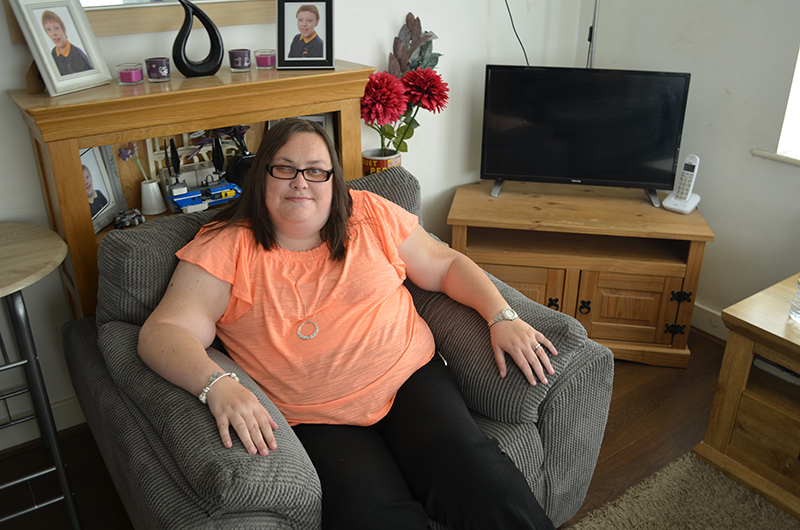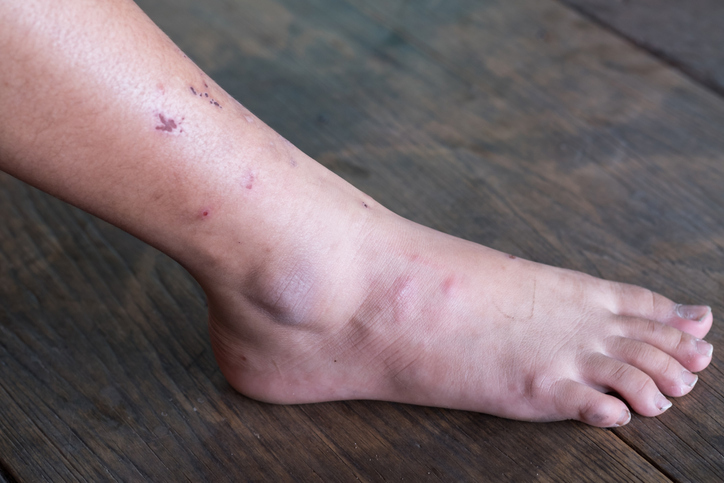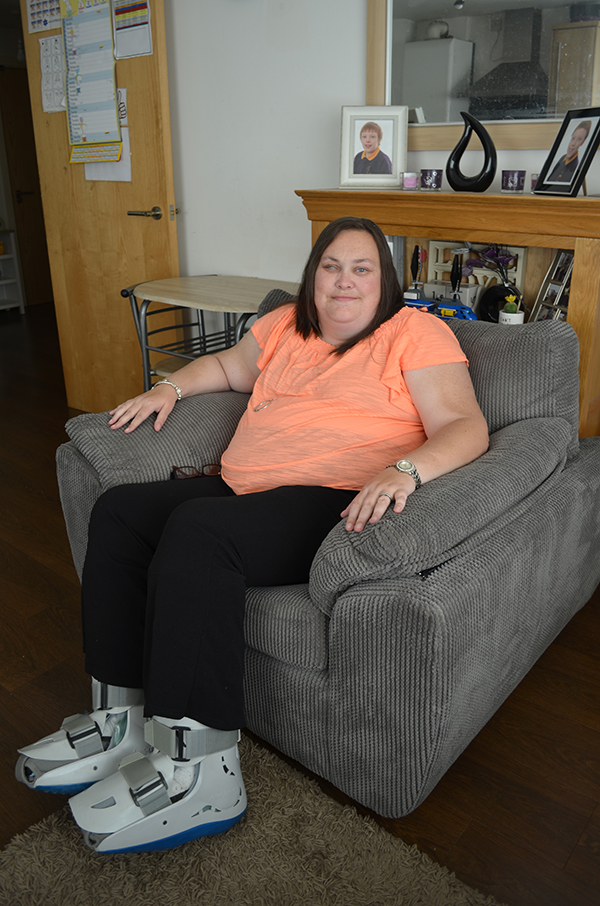Friday, 21 June 2019
A new type of psychological and behavioural treatment for people with diabetes is to be tested in a £2.5 million clinical trial led by researchers at the University of Nottingham and University Hospitals of Derby and Burton NHS Foundation Trust.
About one in 17 people in the UK has diabetes and around a quarter of them may develop foot ulcers at some stage. These ulcers are hard to heal even with specialist care, and in the UK only about half heal within 6 months, causing a huge burden on people with the disease. In some cases, the ulcers lead to amputation of the affected limb and unfortunately many ulcers reoccur within the first year of healing.
The NHS currently spends around £1 billion a year on the care of people with diabetes who have an ulcer on the foot. Now a new package of treatment based on psychological and behavioural interventions is to be tested on patients to try to prevent the recurrence of ulcers and speed up healing if they reoccur.
 Natalie Williams, diabetic foot patient
Natalie Williams, diabetic foot patient
The REDUCE programme has been developed by health psychologists and medical professionals to test whether patients can be ulcer-free for longer if they develop the skills to monitor changes in their feet, maintain safe levels of physical activity, seek early access to medical help and manage their mood. In an earlier pilot study, the team were able to show that patients receiving the programme found it to be acceptable and helpful.
The study is being co-led by Professor Frances Game, Consultant Diabetologist, University Hospitals of Derby and Burton NHS Foundation Trust and Professor Kavita Vedhara from the University of Nottingham’s School of Medicine.
Professor Vedhara said “We are very excited to be carrying out this large-scale clinical trial as we believe the REDUCE programme could deliver huge benefits to patients and save the NHS a lot of money. We know that people’s thoughts, feelings and behaviours towards their illness can affect their risk of getting diabetic foot ulcers and how well they heal. Our programme draws on this evidence and we are hoping it will provide people at risk of reulceration a new treatment which will have a real and lasting effect on the future management of diabetic foot ulcers in the UK.”
We believe the REDUCE programme could deliver huge benefits to patients and save the NHS a lot of money.
The REDUCE programme will have two phases. The first will be 8 sessions held once a week face to face with a nurse or podiatrist and will aim to provide patients with the core knowledge and skills they will need to look after their feet. The second phase will involve access to a website which will provide patients with ongoing support to make sure that the skills they learn in the first 8 weeks are enduring. Patients who do not wish to use the website will be given a handbook. The researchers plan to recruit 544 patients from specialist diabetic foot outpatients’ clinics to take part – half will be randomly allocated to the REDUCE treatment and the other half will receive the current standard care for foot ulcers.
At the moment less than half of patients with foot ulcers will be ulcer-free after six months and a third of patients suffer depression as a result so we believe psychological help could make a huge difference to their lives.
Professor Game added: “There is currently no programme offered by the NHS to people with diabetes who have suffered from ulcers of the foot which has been proven to help them to reduce the risk of future reoccurrence of ulcers. Any treatment which supports them to maintain a safe level of activity without new ulcers could also have a lasting impact on their general health and well-being. We are very excited at the future prospect of being able to offer this programme to every patient with diabetes who has suffered with foot ulcers and improve the lives of so many.”

The researchers will measure whether REDUCE affects how long people remain free of foot ulcers over an 18-month period. They will also calculate any cost-savings to the NHS from reduced incidence of ulcers and whether the new treatment offers value for money. They will examine health-care providers’ and commissioners’ willingness and ability to provide REDUCE and see whether some patients benefit more from the treatment than others, and in what ways.
The researchers plan to recruit 544 patients from specialist diabetic foot outpatients’ clinics to take part – half will be randomly allocated to the REDUCE treatment and the other half will receive the current standard care for foot ulcers.

Patient case study – Natalie Williams from Derby.
Natalie Williams was just 15 when she was diagnosed with diabetes, a condition that is prevalent in both sides of her family. Now, 35 and living with her husband and 9-year-old son in Derby, she is a regular patient at the Royal Derby Hospital where she is treated for recurrent diabetic foot ulcers. Here, in her own words, Natalie tells her story and gives her thoughts on the REDUCE trial which she hopes will make a difference to people with the condition.
“I was ulcer free until I was 25. I was working at the time and had some hard skin on my left foot that quickly turned into an ulcer. I ended up with the ulcer going gangrenous and was admitted to the Royal Derby Hospital. Whilst there, I was advised by the team looking after me that the gangrene from the ulcer had destroyed my little toe and that I needed to have it amputated basically to save my foot. I had the amputation August 2009, and ever since then I have not been ulcer free. I have been on and off antibiotics for years now and last year ended up contracting sepsis through my left foot.
“I recently got ulcers on my right foot and now I wear a Diabetic Air Walker on both feet. I am at the foot clinic regularly for debridement and any other treatment that I may need. Professor Game has been my Consultant for over 10 years now and has saved my feet from amputation more times than I can remember. I suffer from depression due to lots of things and having these ulcers is right up there on the list.
“It is so restrictive having ulcers – just one makes you immobile and that has a devastating effect on your mental health. I feel like I’m on a merry-go-round sometimes, as a pattern usually follows with ulcers – they become infected, you have samples taken, antibiotics administered, the infection goes and before you know it, I’m right back at the start. It also effects family life as I can’t just get up and go and play with my son and husband at the park. It also affects how I dress – I have to pick out carefully what I am going to wear as the casts are so bulky and cumbersome.
“I have been attending the foot clinic at the Royal Derby for about 10 years now and the team who help me are amazing. I owe Professor Game so much.
“I also attend OT Splints every two weeks as I have to have my casts re-moulded. It feels like there isn't a week that goes by where I’m not attending an appointment. This can also have a detrimental effect on family life.”
Story credits
More information is available from Professor Kavita Vedhara via email kavita.vedhara@nottingham.ac.uk
Notes to editors:
About the University of Nottingham
Ranked 97 in the world and 17th in the UK by the QS World University Rankings, the University of Nottingham is a founding member of Russell Group of research-intensive universities. Studying at the University of Nottingham is a life-changing experience, and we pride ourselves on unlocking the potential of our students. We have a pioneering spirit, expressed in the vision of our founder Sir Jesse Boot, which has seen us lead the way in establishing campuses in China and Malaysia - part of a globally connected network of education, research and industrial engagement.
Nottingham was crowned Sports University of the Year by The Times and Sunday Times Good University Guide 2024 – the third time it has been given the honour since 2018 – and by the Daily Mail University Guide 2024.
The university is among the best universities in the UK for the strength of our research, positioned seventh for research power in the UK according to REF 2021. The birthplace of discoveries such as MRI and ibuprofen, our innovations transform lives and tackle global problems such as sustainable food supplies, ending modern slavery, developing greener transport, and reducing reliance on fossil fuels.
The university is a major employer and industry partner - locally and globally - and our graduates are the third most targeted by the UK's top employers, according to The Graduate Market in 2024 report by High Fliers Research. Alongside Nottingham Trent University, we lead the Universities for Nottingham initiative, a pioneering collaboration between the city’s two world-class institutions to improve levels of prosperity, opportunity, sustainability, health and wellbeing for residents in the city and region we are proud to call home. More news…